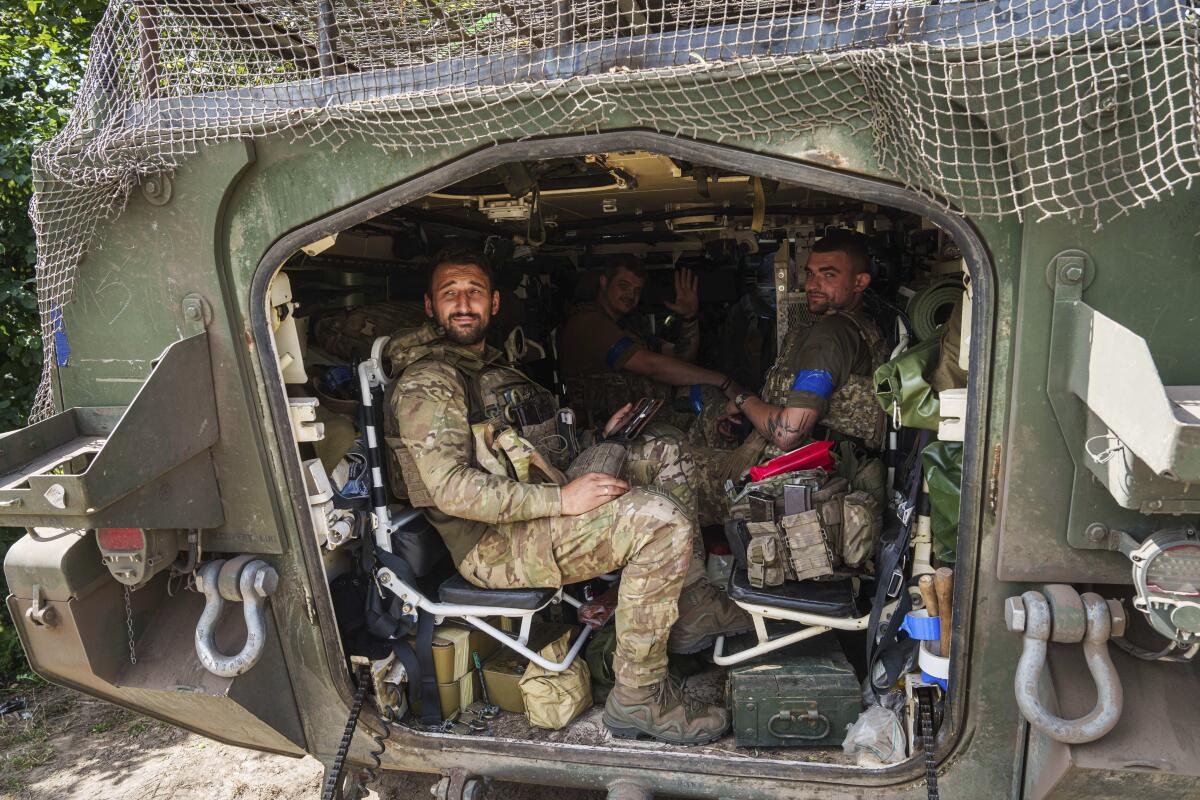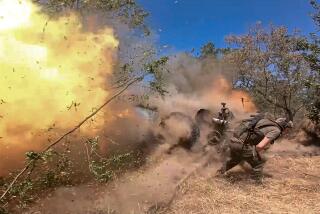Ukraine says it has taken more ground and prisoners in Russian border region

- Share via
KYIV, Ukraine — Ukraine says it has taken more ground, captured more Russian prisoners and destroyed a bomber in attacks on military airfields in its major cross-border advance into Russia.
The surprise Ukrainian charge into the Kursk region that began Aug. 6 has rattled the Kremlin. The operation is the largest attack on Russia since World War II and could involve as many as 10,000 Ukrainian troops backed by armor and artillery, military analysts say.
Ukrainian troops took more than 100 Russian soldiers prisoner, the commander of the Ukrainian military, Gen. Oleksandr Syrskyi, said in a video posted on President Volodymyr Zelensky’s Telegram channel. Zelensky said they would eventually be swapped for Ukrainian prisoners of war.
Assault troops advanced about a mile farther into areas of Kursk on Wednesday, Syrskyi said. Troops destroyed a Russian Su-34 jet used to launch devastating glide bombs at Ukrainian cities, Ukraine’s General Staff said. Syrskyi says Ukrainian forces have advanced into about 390 square miles of the Kursk region, though it was not possible to independently verify that claim.
Ukrainians displaced by war find new purpose in Shakespeare’s play of love, loss and madness, bringing their blood-red version to the bard’s hometown.
Russian authorities acknowledged the Ukrainian gains in the Kursk region, but they described them as smaller than what Kyiv has claimed. Even so, Moscow has evacuated about 132,000 people from the Kursk and Belgorod regions and plans to evacuate 59,000 more.
Ukraine’s deputy prime minister, Iryna Vereshchuk, said Wednesday the military plans to open humanitarian corridors that would allow civilians in Ukraine-controlled areas of the Kursk region to head elsewhere in Russia or into Ukraine.
Ukraine also said that overnight Tuesday it conducted its biggest attack on Russian military airfields since the start of the Kremlin’s full-scale invasion in February 2022.
A Ukrainian security official told the Associated Press that the aim was to sap Russia’s air power advantage in the war. He spoke on condition of anonymity because he was not authorized to speak publicly.
A Ukrainian Foreign Ministry spokesperson said Kyiv has no intention to occupy the Russian territory it controls. The goal is to stop Russia from firing missiles into Ukraine from Kursk, he said.
Analysts say Kyiv’s forces targeted the Kursk region because Russia’s weak command-and-control structure there made it vulnerable.
“The situation is still highly fluid, but with clear signs that the Russian command and control of responding units is still coming together, with all-important unity of command not yet achieved,” said retired U.S. Vice Adm. Robert Murrett, a professor and deputy director of Syracuse University’s Institute for Security Policy and Law. “The next 2 to 3 days will be critical for both sides.”
Trump’s running mate, J.D. Vance, once said: ‘I don’t really care what happens to Ukraine one way or the other.’
In AP video shot in Ukraine’s Sumy region, which borders Kursk, Ukrainian trucks and armored vehicles traveled along roads lined with thick forests. Analysts say the region is a staging ground and logistics hub for the incursion.
Meanwhile, Russia’s Belgorod border region, which is next to Kursk, declared a regional emergency Wednesday during heavy Ukrainian shelling. A federal emergency was declared in Kursk on Saturday.
Belgorod Gov. Vyacheslav Gladkov described the situation there as “extremely difficult and tense,” as the attacks destroyed homes and caused civilian casualties.
Children in particular are being moved to safety, he said on his Telegram channel, adding that about 5,000 children were in camps in safe areas. He said the previous day that roughly 11,000 people had fled their homes, with about 1,000 staying in temporary accommodation centers.
It wasn’t clear how, when or whether Ukraine would attempt to extricate itself from the ground it has taken. The Ukrainian military says it controls 74 settlements, believed to be villages or hamlets, in the Kursk region.
Ukraine’s 1+1 TV channel published a video report Wednesday that it said was from Sudzha, a Russian town about six miles from the border. It showed burned-out Russian military columns along roads and Ukrainian soldiers handing out humanitarian aid and taking down Russian flags from an administrative building.
Russia’s predicament is whether to pull troops from the front line in Ukraine’s Donetsk region, where achieving a breakthrough is one of the Kremlin’s primary war goals, to defend Kursk.
President Biden said Tuesday that the developments in Russia are “creating a real dilemma” for Russian President Vladimir Putin.
“Russian authorities will likely remain extremely averse to pulling Russian military units engaged in combat from [Donetsk] and will likely continue deploying limited numbers of irregular forces to Kursk … due to concerns about further slowing the tempo of Russian operations in these higher priority directions,” he said late Tuesday.
A woman in Belgorod told the AP on Tuesday that the Ukrainian shelling had been more intense for about 10 days until Monday, when it was followed by a lull. The number of people in Belgorod who openly supported the war has decreased, she said, speaking on condition of anonymity because of security concerns.
“When explosions started near the city, when people were dying and when all this started happening before our eyes … and when it affected people personally, they stopped at least openly supporting” the war, the woman said.
Zelensky indicated that the Kursk operation is also intended to lift his country’s spirits after 900 days of war and to rally people by making an emphatic statement about Ukraine’s military capabilities.
“Now all of us in Ukraine should act as unitedly and efficiently as we did in the first weeks and months of this war, when Ukraine took the initiative and began to turn the situation to the benefit of our state,” Zelensky said in his nightly address Tuesday.
Associated Press writers Novikov reported from Kyiv and Burrows from London. Barry Hatton in Lisbon, Portugal, contributed to this report.
More to Read
Sign up for Essential California
The most important California stories and recommendations in your inbox every morning.
You may occasionally receive promotional content from the Los Angeles Times.















